Coconut oil is often considered a bit of a ‘miracle oil’ in the nutrition world. As its popularity has grown so have the questions about its various benefits, types, uses, storage and applications. It’s a staple in paleo and keto diets but there are many more uses of coconut oil in and out of the kitchen. I have put together this useful reference guide to answer the most common questions about the coconut oil and to give you new ideas on how to use this fantastic ingredient.
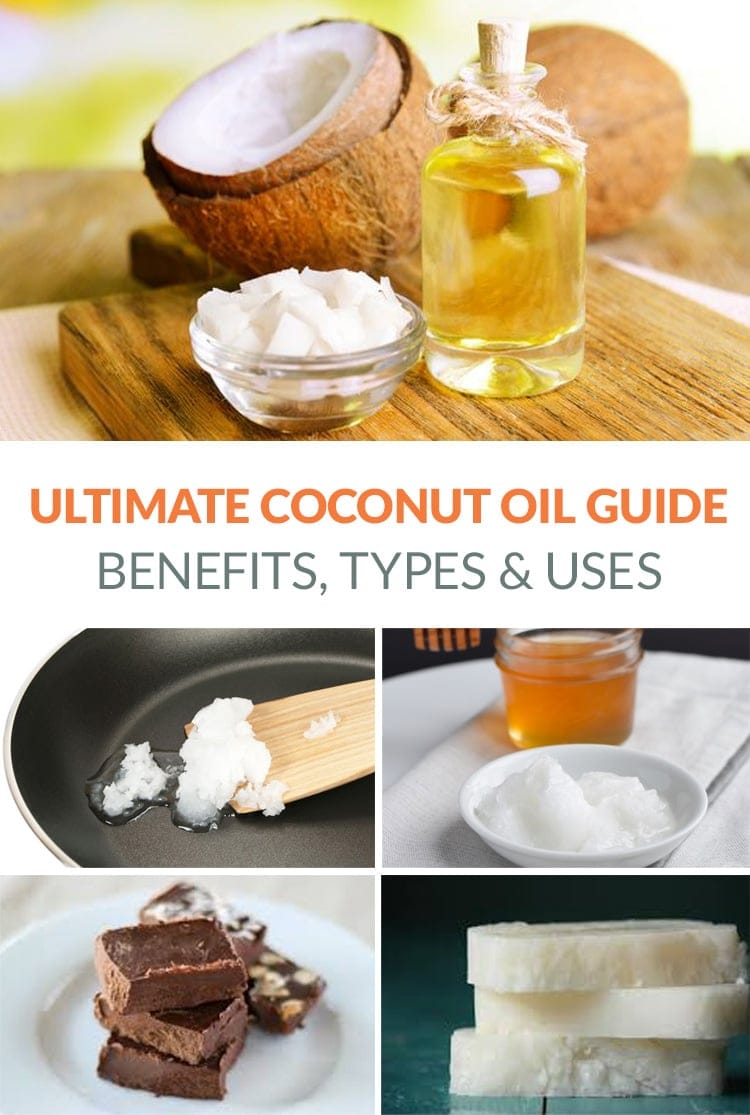
So, what is coconut oil?
Coconut oil is an edible oil, that is extracted from the meat or kernel of coconuts, which is primarily used in cooking. For many parts of the world and including places such as the Philippines, it is the most commonly used cooking oil.&
The oil, comprising of up to 95% saturated fat is said to have many health benefits, including anti-inflammatory properties, antibacterial and may aid in weight loss. Unlike other highly saturated and unsaturated fats, virgin coconut oil is made up of 70-85% medium chain fatty acids (MCFAs) – which are sometimes also referred to as medium chain triglycerides (MCT).
The saturated fat content in coconut oil makes it a good heat-stable oil for cooking and prolongs its shelf life. Coconut oil is a very versatile oil and is also known to be used as engine fuel, an engine lubricant, skin moisturiser, soap, herbicide and as sand fly repellent!
Benefits of coconut oil
Coconut for weight loss
- Coconut oil is high in MCFA’s (MCT) which are easily oxidized lipids and are not stored in adipose tissue (fat tissue), unlike long chain fatty acids. MCFA’s are able to be utilised for energy and increase thermogenesis. Studies have shown that when a diet rich in MCFA’s is consumed, more fat loss occurs than with a diet rich in olive oil which is high in long-chain fatty acids (LCFA).
- A diet containing MCFA’s has also been shown to be more satiating than a diet containing LCFA’s. Meaning you feel fuller for longer and are less likely to binge on either sugary snacks or eat between meals.
Coconut oil and cholesterol
Although for many years saturated fat has been associated with raised LDL cholesterol and an increased risk of coronary heart disease (CHD). We know now that this is not the case, with a recent meta-analysis of 21 studies highlighted that “there is no significance for concluding that dietary saturated fat is associated with an increase of CHD or CVD” Siri-Tarino et al, 2010.
- Coconut oil contains approximately 50% lauric acid and a diet rich in this has been shown to produce more favourable cholesterol levels than a diet rich in trans-fats.
- Another study showed that coconut oil consumption was associated with higher levels of HDL (good) cholesterol, especially amongst pre-menopausal women.
Anti-ageing and skin health benefits of coconut oil
- Virgin coconut oil has antibacterial, antifungal and antiviral properties and has been shown to be beneficial for people suffering from acne (applied topically and taken internally).
- It helps wounds heal and gives collagen a boost as well, which provides support for the underlying structure of your skin
- Coconut oil can be used as a natural oil cleanser. It can be used to gently remove makeup, including waterproof mascara and leaves skin feeling fresh, hydrated and clean.
- Coconut oil can also be used to hydrate the skin and increase skin surface lipid levels, which helps to plump up the skin and reduce signs of ageing. It should be noted that all skin is different and sensitive skin may react with coconut oil, so only use it if it works for you.
Coconut oil and Alzheimer’s prevention
- Coconut oil for the prevention of Alzheimer’s came to media attention with the story of Dr Mark Newport in 2008 and testimonies of the benefits of coconut oil for Alzheimer’s can be found everywhere.
- Alzheimer’s is now often referred to as type 3 diabetes as it “corresponds to a chronic insulin resistance plus insulin deficiency state that is largely confined to the brain” de la Monte et.al (2008). It is hypothesized that the rise of Alzheimer’s is linked with rising obesity, type 2 diabetes and statin use.
- According to Dr Newman “In Alzheimer’s disease, the neurons in certain areas of the brain are unable to take in glucose due to insulin resistance and slowly die off…if they have access to ketone bodies (from coconut oil), they could potentially stay alive and function”. (2008)
Coconut oil as an antioxidant
- Coconut oil is a known antioxidant, which may be in part due to the phenolic compounds found in the oil. It has been found that these compounds in higher levels in virgin coconut oil when compared with refined, deodorised and bleached coconut oil (RDB coconut oil). For this reason, it would be better to try to always buy virgin coconut oil.
Be aware
- Many of the studies which highlight the potential benefits of coconut oil on lipid profiles have been conducted on population groups where the oil has been traditionally a staple. These studies do not, therefore, reflect how other population groups might respond to a sudden increase in the consumption of coconut oil.
- It is not always a case of ‘a little bit is good, so a lot must be great’. Coconut oil consumption should always be a part of a varied diet and should not be eaten in extreme amounts.
- Some people may react to the use of coconut oil on the skin and it is not suitable for everyone. Monitor if you are using it as a skin cleanser or moisturiser and discontinue use if irritation or continual breakouts occur.
Types of coconut oil
Refined coconut oil
- Made from dried coconut, also known as copra; the standard end product made from the dried kernel (meat) is RBD oil, which stands for refined, bleached and deodorised. The reason the oil has to undergo this process is that the dried copra is not fit for consumption and the oil needs to undergo processes to filter our impurities and to make it more stable; it’s a pretty common way to mass-produce coconut oil.
- Because it’s refined, it’s fairly tasteless and doesn’t smell like coconut; it can withstand higher cooking temperatures before it reaches its smoke point; great for deep-frying foods without the flavour of coconut.
- It’s not as great as the virgin, completely raw coconut oil but still has the same beneficial medium chain fatty acids; from what I read, it’s very close in its nutritional value to virgin coconut oil so it’s more about the extraction method and what chemicals have been applied.
- Most of the coconut oils available in grocery stores and vitamin stores are refined unless they specifically state otherwise; not all refined oils are created equal so try to get good quality, non-hydrogenated (yep, even coconut oil can be hydrogenated or partially hydrogenated but mainly in tropical, Asian countries), and refined using natural, chemical-free process like steam or diatomaceous earth.
- Refined oil is great if you’re on the budget as it’s usually cheaper. It’s also good for things which require lots of oil like deep-frying, using it as a bath oil or in soaps, or using it as a body moisturiser.
- I love Biona Coconut Oil Cuisine and use it in cooking all the time.
Unrefined coconut oil
- Usually labelled as ‘virgin’ or ‘extra-virgin’, this coconut oil is made from the first pressing of fresh, raw coconut using mechanical means without the addition of any chemicals; depending on the extraction method, the flavour can be mild to very intense (more heat exposure during extraction, more coconut flavour in the oil).
- Good raw, unrefined, virgin coconut oil should have a very mild coconut flavour and scent.
- The difference between ‘virgin’ and ‘extra virgin’ is, well, pretty much none existent as far as I’ve researched, it’s more of a marketing trick to get you to pay more.
- Virgin, unrefined oil is more superior to refined coconut oil.
- In Australia, I love coconut oil from Niulife. Outside of Australia, I tend to buy Merchant Organic’s Coconut Oil.
Extraction methods
Cold-pressed, expeller-pressed or centrifuged are methods of extracting oil from dry or fresh coconut and can be used for both refined and unrefined varieties. All methods can create a good, healthy oil.
Expeller-pressed and cold-pressed don’t always mean ‘raw’ as sometimes these oils are heated to rather high temperatures during the extraction process, which is not a problem as coconut oil is a highly stable fat and will not go rancid. It does, however, mean that the flavour will be more coconutty. If you want more mild and delicate coconut oil, look out for a centrifuged oil which is less likely to be exposed to heat during extraction.
Buying coconut oil
There are many brands and types of coconut oil and they vary in price depending on the source, production method, packaging and the marketing team. Super expensive doesn’t always mean the best, although it does often indicate the quality of ingredients and the purity.
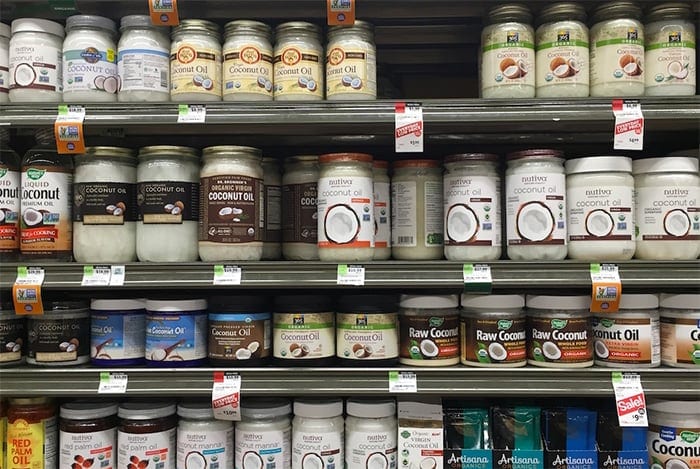
I always recommend to try a few brands and to find out as much as you can about the manufacturing process. There are many great brands out there and regardless of where you are, here are a few things to look out for:
1) Colour – white colour when it’s solid and colourless when liquid, any discolouration might mean contamination and inferior quality.
2) Aroma and flavour – virgin, unrefined coconut oil should smell and taste like coconut but should not be overpowering and strong, if it smells roasted or smokey it means it’s been exposed to a lot of heat and it might not retain as many nutrients; and if it’s odourless and neutral tasting then it’s most likely refined and treated.
3) Price – the coconut oil in most stores can get quite pricey and doesn’t always mean superior product. It’s always a good idea to buy in bulk as the oil is stable and will last for at least 12 months. You can try a few different brands and make sure you like the smell and taste before you commit to buying a big batch. You can also share the shipping costs with friends and family and save even more money.
I love Biona Coconut Oil Cuisine (refined, mild and odourless) and use it in cooking all the time. For raw/unrefined/viring coconut oil, I love coconut oil from Niulife (Australia). Outside of Australia, I tend to buy Merchant Organic’s Coconut Oil.
Storing coconut oil
Coconut oil can be stored out of the fridge, away from direct sunlight, for up to two years. It will stay liquid in temperatures above 25C (75F) and will turn into butter and solid texture in lower temperatures or if refrigerated. If the oil is solid and you need to use it in a liquid form, apply low-level heat and it will transform very quickly.
How to use coconut oil?
If you have never used coconut oil before, start off slowly and just assess how your body reacts to it. Introducing it in the diet too quickly can result in gastrointestinal upset and diarrhoea. Most adults can usually tolerate somewhere between 2-4 tablespoons per day, but again, see how much suits you as an individual.
There are hundreds of ways you can use coconut oil – in cooking, as part of your skincare routine, as part of flu and cold treatment, or to rub on cuts and bruises. I’ve put together a few examples of how you can use it.
Coconut oil as a food
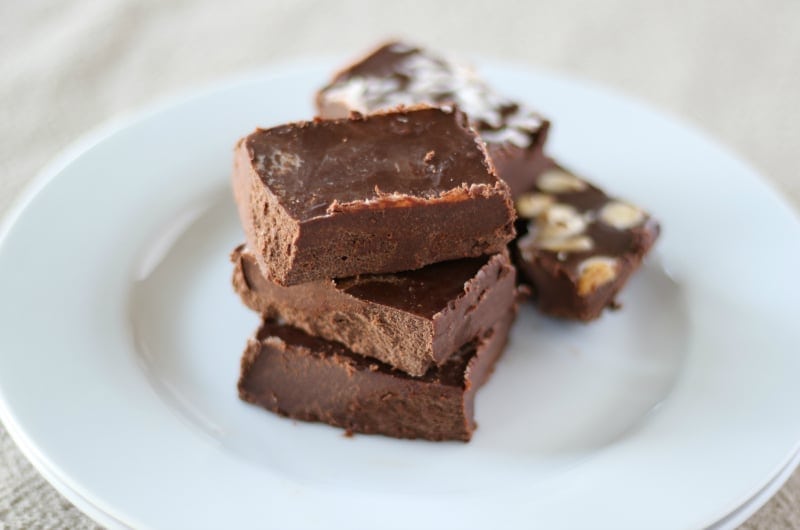
- I use coconut oil in cooking as it’s very heat-stable. I fry and deep-fry in it, rub it on my roast meats, stir-fries and sauces. It’s really good for Asian cooking as its flavour is very complimentary.
- It is a solid most of the time at room temperature or when refrigerated and is, therefore, a great substitute for butter or margarine and can be used for dips, spreads, in baking and desserts. Use a 1-to-1 ratio when substituting other oils or butter for coconut oil. I use it in my grain-free granola recipe, cherry ripe chocolate truffles, or when pan frying my meatballs.
- It can even be used to make mayonnaise, I would use a good quality refined coconut oil for that.
- Add a couple of teaspoons to smoothies, juices, tea or coffee.
- Refrigerate it and eat as is by scrapping some with a teaspoon. The taste is slightly sweet and subtle, it really is quite nice and doesn’t have that oily texture you might expect, more like white chocolate.
- Mix some coconut oil with cacao & honey for a quick energy boost before a workout.
- Coconut oil is great for making keto and paleo-friendly fudge and fat bombs.
Coconut oil FOR skin & hair
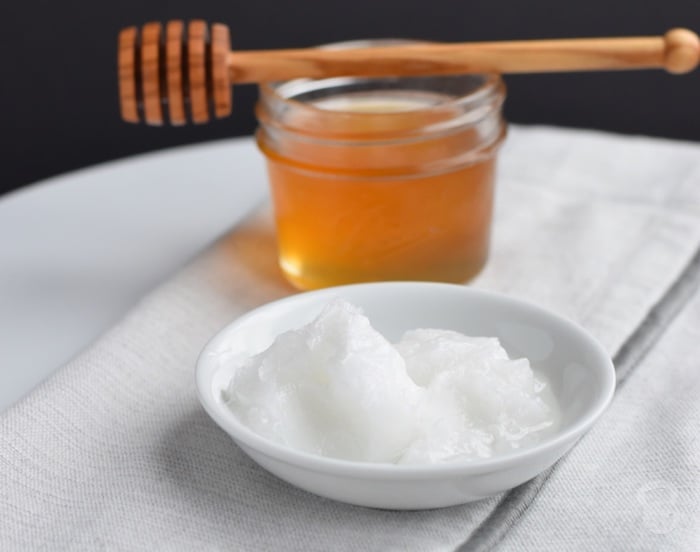
- Use it as a face or body moisturiser. Many women use it to improve and to prevent the appearance of stretch marks.
- Use it as a massage oil or bath oil, we add 4-5 tablespoons to a hot tub and your skin is wonderfully soft and moist after.
- Use coconut oil to make natural homemade soap, deodorant, toothpaste, and even a bug repellent.
- Use it to make this DIY honey and coconut face mask or this nourishing hair mask.
- Rub it into dry hair and wrap with a towel for a couple of hours before washing with shampoo.
- Use a little on your hair to remove the fizz.
- Helps to heal skin after a sunburn. Make sure to apply coconut oil after the initial heat burning sensation is gone.
- Believe it or not but rubbing some coconut oil on the skin will also protect it from the sun, it has SPF4.
- Can be used as a naturally antibacterial skin cream, an aftershave lotion, and to improve the appearance of cellulite.
- Mix with salt or sugar for a great skin exfoliator or to rub the dead skin off your feet.
- Use as a safe baby lotion.
- Use on your hands after doing the dishes to avoid dry skin.
- Use on cuticles to help nails grow and rub into elbows to help with dry elbows.
Other Uses OF COCONUT OIL
- It can be used as a natural treatment to get rid of head lice. Full instructions here.
- Rub a little on wounds and cuts to promote healing and avoid infection.
- Given its antifungal properties, the oil can be used on feet to fight athlete’s foot or tor fungus.
- Use to season cast iron skillets and frying pans.
- Applied externally, it can help pets struggling with skin issues.
- You can make a homemade vapour rub by mixing half a cup of coconut oil with a few drops of eucalyptus and rosemary oils to rub on the chest and throat.
- Coconut oil can even be used as a sexual lubricant, although it can damage latex condoms.
- Some have used topically to kill yeast or yeast infections.
- Rub on cold sores to speed healing and prevent bacteria from growing.
Using coconut oil in your cooking and in the home is so easy!! It is more or a case of what can’t you use it for! Coconut oil is so versatile and had hundreds of uses.
References
- ALSUntangled, Group. “ALSUntangled 15: Coconut Oil.” Amyotrophic lateral sclerosis: official publication of the World Federation of Neurology Research Group on Motor Neuron Diseases 13.3 (2012): 328.
- De Roos, Nicole M., Evert G. Schouten, and Martijn B. Katan. “Consumption of a solid fat rich in lauric acid results in a more favorable serum lipid profile in healthy men and women than consumption of a solid fat rich in trans-fatty acids.” The Journal of Nutrition 131.2 (2001): 242-245.
- Feranil, Alan B., et al. “Coconut oil predicts a beneficial lipid profile in pre-menopausal women in the Philippines.” Asia Pacific journal of clinical nutrition20.2 (2011): 190.
- Liau, Kai Ming, et al. “An open-label pilot study to assess the efficacy and safety of virgin coconut oil in reducing visceral adiposity.” ISRN pharmacology2011 (2011).
- Marina, A. M., et al. “Antioxidant capacity and phenolic acids of virgin coconut oil.” International Journal of Food Sciences and Nutrition 60.S2 (2008): 114-123.
- Newport, Mary T. What If There Was a Cure for Alzheimer’s Disease… and No One Knew? http://www.coconutketones.com/whatifcure.pdf, July 2008.
- Prior, Ian A., et al. “Cholesterol, coconuts, and diet on Polynesian atolls: a natural experiment: the Pukapuka and Tokelau island studies.” The American journal of clinical nutrition 34.8 (1981): 1552-1561.
- Siri-Tarino, Patty W., et al. “Meta-analysis of prospective cohort studies evaluating the association of saturated fat with cardiovascular disease.” The American journal of clinical nutrition 91.3 (2010): 535-546.
- St-Onge, Marie-Pierre, and Aubrey Bosarge. “Weight-loss diet that includes consumption of medium-chain triacylglycerol oil leads to a greater rate of weight and fat mass loss than does olive oil.” The American journal of clinical nutrition87.3 (2008): 621-626.
- Suzanne, M., and Jack R. Wands. “Alzheimer’s disease is type 3 diabetes—evidence reviewed.” Journal of diabetes science and technology 2.6 (2008): 1101-1113.
- Takeuchi, Hiroyuki, et al. “The application of medium-chain fatty acids: edible oil with a suppressing effect on body fat accumulation.” Asia Pacific journal of clinical nutrition 17 (2008).


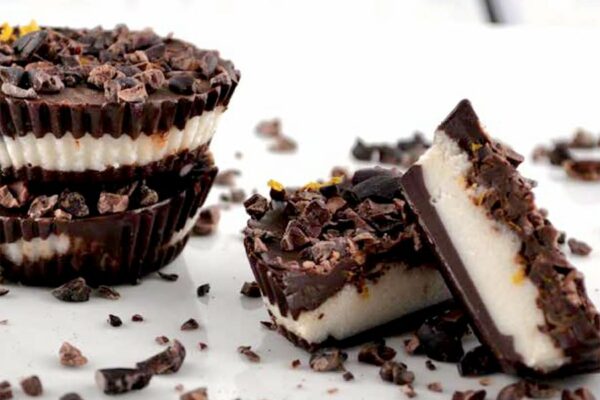
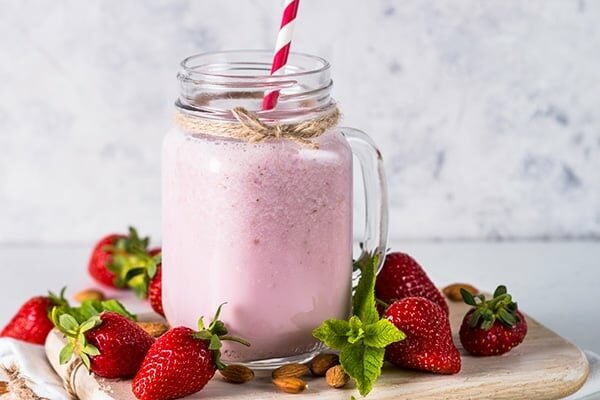
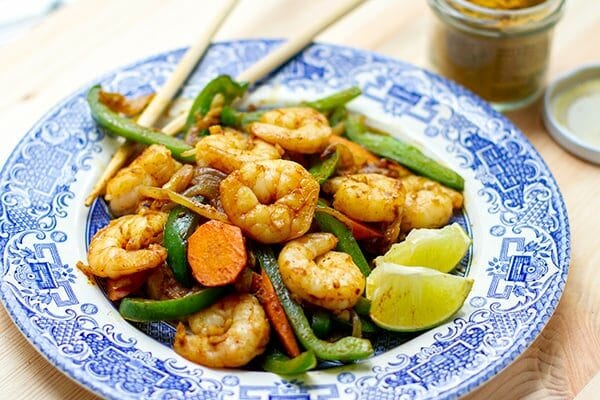
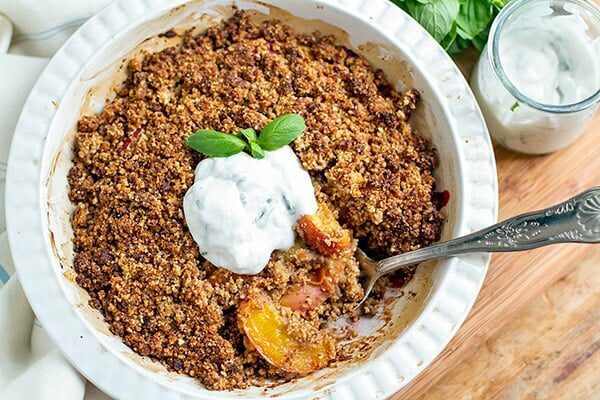
Thanks for the great summary!
Hi, I have heard that coconut oil is very good for helping lower cholesterol – or rather boosting the HDL cholesterol and lowering LDL cholesterol. Is this true as I don;t see this mentioned in any of your benefits? In past years, those with cholesterol problems have been told to avoid coconut oil. I am interested to know. Thanks.
According to new research at the Queensland University in Australia, coconut oil is not good for the heart, it does not lower bad cholesterol, fish oil is vital for heart disease. I LOVE coconut oil, but if you have a heart condition, then it pays to do your research to ensure what you are putting in your body is right for you.
http://www.uq.edu.au/news/?article=26277
I will definitely have a read!
The UQ article doesn’t offer new research on coconut oil, it just states Coconut oil has saturated fat – which is not news. Is saturated fat bad for your health – well the evidence is mixed. If you remove saturated fat then you replace it with something else and there is no evidence this is simply more healthy.
See Astrup A, Dyerberg J, Elwood P, et al. (April 2011). “The role of reducing intakes of saturated fat in the prevention of cardiovascular disease: where does the evidence stand in 2010?”. Am. J. Clin. Nutr. 93 (4): 684–8. doi:10.3945/ajcn.110.004622. PMID 21270379
I add some to my coffee every morning. I have also used it for oil pulling.
Thanks for all the info. Have recently started using coconut oil in my cooking I help with weight loss and I don’t notice the difference! It’s hot so many good point about it, I will never go back to olive oil!
Thanks for the article! I love coconut oil and recently started doing ‘oil pulling’ with it. I’m still in the beginners phase but it feels pretty good.
It works really well on psoriasis too!
I really enjoyed your article, since I am a coconut oil enthusiast too! I am using it for cooking and baking as well as for my hair as a conditioner and anti-dandruff treatment (excellent), as skin lotion, massage oil, sunscreen/tan (got to be careful of sun exposure though), cuticle massage before painting my nails. :))) It is good for everything!!
Great article, I’m a massive fan of coconut oil and recommend it to all my clients! Thank you for all your research & putting together such a comprehensive article, off to share it now!! 🙂
Glad you found it useful! I love it too.
I bought spectrum refined coconut oil and I’m using it for skin care and energy
will it give me the same benefits ??
Hi Jackie, I am not familiar with that brand specifically but you should be able to rip most of the benefits if it’s good quality coconut oil.
Love this article, Irena! We’ve started adding coconut oil to our post-workout smoothies, and I’ve certainly noticed the difference in my skin. It adds a delicious, subtle flavour and adding it to a smoothie is a simple way to introduce it to your diet. I like cooking with it for Asian foods, too. Goes great with scallops, or green beans. Yum.
Hi Emily I am looking for a way to add coconut oil to my day per liquid intake and was wondering how u make your smoothies with it, could u tell me your recipe?
Great article….I was in the same camp as you about how coconut oil was bad for you without doing much research. Having a Thai green curry was a bit of a guilty pleasure. But based on this article I plan to get some oil and use it in my cooking more often. When I was a kid, they used to recommend using copra as a binding agent when making coco pops bars but I found the taste horrible.
Amazing research on the benefits of coconut oil.. I belong to Kerala a small state in India where traditionally we use coconut oil for cooking. The name of the state Kerala is also derived from the name coconut(in malayalam language of kerala , kera is coconut). Coconut is one of the main agriculture of kerala. But now a days big propaganda is going on that coconut oil contains lots of saturated fats and it raises your cholesterol levels and finally leads to heart attack. So people in my place are shifting to other refined oils instead of coconut oil. Your article should be an eye opener to the people who talk against coconut oil.
Great article! But one thing….
What about the benefits of MCT oil? I think they follow (and even supercharge) a lot of your guidelines outlined above.
Absolutely, it’s very good for you but maybe I will cover it in the next article 🙂 I got a bottle delivered the other day, still trying to come with different ways to use it.
This is one of the most informative articles I’ve read online in a really long time. Thanks for taking the time to pull all of this information together in one place. I literally had NO idea that coconut oil could be useful for bacterial and fungal infections.
I finally found coconut oil in our local supermarket (in Kenya!). I came straight to your site for some recipes, and found this great write up – thank you for sharing!
One minor suggestion, you mention earlier that it’s antibacterial, anti fungal and anti viral, but perhaps add ‘in treating many bacterial, fungal AND VIRAL infections’ to the statement below, as the last three infections you mention are all viruses
“Coconut oil fat is nearly 50% lauric acid, which is converted by the body into monolaurin and makes coconut oil effective in treating many bacterial and fungal infections such as candida, athlete’s foot, measles, influenza, and hep C.”
Paleo Recipe: gluten, soy, dairy and preservative free. You can make a basic salad with onions, tomato and cucumber and serve
it with the slowly roasted chicken. Preparing food guides, graphs and reference point bedding.
I’m lucky enough to be a Hawaii girl and I make pineapple jam every year. The best tasting breakfast/snack you could ever have is pina colada toast, coconut oil (in place of butter) and pineapple jam. So good!
Hello I’m just wondering if you know about wether coconut oil is good for someone with M.S ?
Thank you 🙂
From what I have read, the answer is yes as it has anti-inflammatory properties. Also, lots of Omega-3 fatty acids such as those found in oily fish (salmon, trout, sardines, seafood) and chia seeds/flaxseeds, green leafy vegetables, free-range eggs, grass fed meat instead of grain fed meat. I hope this helps.
Re: MS. Have you heard of Teri Wahls? She used diet to combat her fast progressing MS. Going from being fully reclined in a wheelchair to riding a bike within 5 months! She now has a foundation.
Great summary on the benefits of coconut oil. Yes it is good news that coconut oil is starting to gain recognition as being a good healthy fat instead of being promoted as a bad fat – then again it was not all that long ago when low fat diets were the thing and all fat irrespective of the type of fat was promoted as being bad for you.
Can you use just any coconut oil from the supermarket for all these purposes? Eg. Cooking, hair, skin etc. ?
Yep!
we produced high quality virgin coconut oil (VCNO) in P N G.
we have suspended production as we could not find buyers prepared to pay a fair price
I don’t really like the taste. My question is will I get the same results, eating it with low fat yogurt and still using one table spoon 3 times a day in the yogurt?
Yes. You can add it to other foods and still get the benefits. We cook with it and I sometimes add it to smoothies or coffee.
I’ve only just started using coconut oil at home, so thanks for the info about the different types of oils. I’ve used the oil to make my own Ice Magic topping, and I use it in my homemade baby wipes with a bit of tea tree and lavender oil, water and and a dash of my daughters regular baby wash and baby oil, she hasn’t gotten a single rash since switching to homemade. I’m also looking forward to making chocolate crackles and a ‘block of chocolate’ with the oil too.
Wow man I have no idea that coconut oil has lots of benefits in our daily life. But I really like to use coconut oil for skin and hair. Thoroughly I really enjoy your post, thanks for sharing it.
I have been using coconut oil since following the paleo diet for about a month now. I oil pull in my mouth in the morning, have it with coffee and ghee in the morning, put in on my face, hands, arms, and nails, etc. each day. I also use it for all of my cooking now. I love it, and it is indeed a tasty addition to broiled and baked fish and meat dishes, stir fry, scrambled eggs in the morning, etc.
My only concerns are there are 120 calories in each tablespoon, and although I have lost weight on the paleo diet, I am concerned about how many calories I might be taking in — also, I have skin eruptions on my arms and back since using coconut oil — I read I might still be detoxing but I am not sure. I would appreciate any comments. Thank you.
Hi Michele,
First of all, I am not a doctor so this more of a personal comments based on what I’ve experienced and read. I personally don’t like to focus on calories too much but what I know about coconut oil in general is that when you introduce it to your diet, you should do it a little bit at a time. I also think it’s probably not a great idea to use it as your only oil. I like to encourage people to cook and use a variety of oils to get the benefit of different nutrients – I use macadamia oil, ghee, avocado oil and butter and of course coconut oil as well. Every person has completely different body composition, goals and reactions to different foods so it’s not practical to prescribe one-fits-all approach. I would ease on the coconut oil a little bit – maybe remove it from you coffee since you already cook with it and stop using it on your skin for a few days to see if perhaps you might have a topical reaction to it. You body might be telling you – “TOO MUCH COCONUT OIL coming from everywhere all of a sudden”. So dial it back a little, that’d be my advice.
In general, very high fat intake is fine if your carb intake is quite low. If you still like lots of fruit, bananas and starchy vegetables, use a little less fat. That’s my rule of thumb.
Irena
Thank you for replying, Irena and I think you are right. I had to chuckle at your advice “You body might be telling you – “TOO MUCH COCONUT OIL coming from everywhere all of a sudden” – It is true, all at once, I gave up wheat, dairy, and was using coconut oil for the first time in my life — all over the place! — although I feel great, I will definitely take your advice to dial back a little on the coconut oil. Thanks again for your comment and advice — I love your site and will definitely be ordering your book.
Hi, I recently just purchased the spectrum brand coconut oil, it says it mechanically (expeller) pressed naturally refined organic coconut oil, it this type ok to consume by the spoonful? And is there any difference besides smell and taste between this and an unrefined type?
Hi thank you for this very informative blog. I am doing a research on coconut oil and this surely helped. I just want to ask whether you could share with me your sources of the general information such as the types of coconut oil? I will cite your blog as a reference but if you could point me please to the main source – like a book or a journal, that would be wonderful. Thank you!
This was so very helpful!! Thanks so much!
Hi,
Coconut oil has also been found to reverse the effects of Dementia and Alzeimers in most people.
There have been no credentialed human studies published on the health benefit of coconut oil on humans, especially with respect to Dementia and Alzeimer’s that I am aware of. Most claims are hearsay and not based on any controlled and documented studies on humans.
If you have some that you can share, I would love to see them and will include them in my lectures on oils and fats if they are properly controlled and documented studies from a respected nutrition research institute.
Seems suspiciously similar to this 2011 article:
http://www.foodrenegade.com/how-to-choose-a-good-coconut-oil/
I’ve actually never stumbled across that site. I’ve gone through about 30 websites and multiple resources collecting all of the latest information about coconut oil and then wrote my post. When you search for coconut oil online, there are another 100 websites covering this ingredient in a similar manner. To imply that I have somehow stolen content from someone else is simply rude.
Hello, I love the enthusiasm on eating tasty food whilst looking out for your health! However, as a dietitian, I would never recommend coconut oil over unsaturated oils for health reasons. Yes, if you like the taste there’s no worries incorporating some into a healthy diet, but very sparingly, and as a treat.
I would definitely recommend unsaturated oils like olive and canola over coconut oil because, it is so important to make sure we keep our saturated fat intake to a minimum and also, they’re cheaper!
Sarah
Hi Sarah, I mean absolutely no disrespect but have you read the latest research into saturated fats? “Saturated fat is bad” is a really old-school view and the myth is finally getting put to bed. Canola oil is terrible, it’s high in Omega-6 fatty acids which are highly pro-inflammatory and oxidise easily, making it an unsuitable oil for cooking really. Olive oil is great but so is butter and coconut oil. I can send you a few links and articles that you might find interesting 🙂 Irena
Thanks for all your hard work! Also for your diplomatic responses to criticism. Good job and much appreciated.
Great tips for both cooking and skincare applications of coconut oil.
Coconut Oil is my favourite natural product! It super multi-purpose. Always worth buying a big jar of it :).
I’m a coconut oil newbie. Don’t like the taste much, it feels like coconut flavoured lard in my mouth BUT I want to see if it works so I’m persevering! Have just had 2 teaspoons in a beaker of milk with a little hot water in there to liquify the oil. It wasn’t bad… I’ll try some of the other great suggestions here though – thank you
Hi.My mum suffers with Arthirisis in hand and legs.A friend did mention Coconut Oil.I am not sure though.
She is 68 yrs.Please advise further.Which one and how do u take this. I am partly employed and have a tight Budget.Thank you fot all of the rest of the info.I am qiite amazed by the benefits and uses on Coconut Oil.
Amazing post! The guide you have shared was amazing. Coconut oil is one of the easiest and safest ways to be healthy. It is always difficult to identify which coconut oil brand I should prefer. Your blog is really helpful for me to understand what’s good for me. Thanks for sharing this post.
I take Cod Liver Oil capsules two per day. Can I also take coconut oil as well with no side affects from taking both?
Can you use the same type / form of coconut oil as a beauty product and as a food?? I bought a jar of it for use as a beauty product, skin cream, but can I also cook with that same one??
You should be able to if it’s just coconut oil in the ingredients. I use the same jar for cooking and as a body moisturiser too.
Hi, I want to start trying this for the health benefits. But I hate coconut! I can taste it in anything it is in, when other people don’t, or the don’t realise untill iv pointed it out. So I would like to know, which tote is best for no scent/taste? I brought a jar at a health food shop today and asked their advice on this, and stupidly took their advice blindly! When I read the jar when I got home, it says on the front label
Virgin, cold pressed, rich coconut aroma and flavour!
Also organic unrefined.
Does the refined types have less taste/smell? And if they do, will they still give me the health benefits? Or is it just not worth it?
Thanks
Bel
Yes, the refined type have less coconut smell/taste. It’s still a good type of fat with nutritional benefits but just a little less than unrefined. I often use refined for cooking savoury food and unrefined for treats or just to have as a teaspoon.
Also, if refined oil has been processed, does that mean that there are extra chemicals in the oil?
I added a teaspoon to my dogs food tonight- hoping it may help with his skin allergies- he loved it!- so the unrefined is great for him, and will hopefully have a good outcome. So he can stick to the unrefined.
Cheers
Bel
Refined oil is coconut oil that’s treated with high heat. It doesn’t necessarily have extra chemicals. Of course, every producer might have a different refining process so best to check with the product owners if you’re not sure.
I’m trying some for an itchy skin problem. I swallowed a few teaspoons and nearly went the technicolour yawn, so directly to the problem areas for me from now on. Refined is ok for this?
For skin, I would use unrefined.
Hi, I was wondering if the refined organic coconut oil will help with an infection on my toe. Should I bandage it with the coconut oil, or leave it to air dry?
Also, would the unrefined oil work better?
Thanks so much!
Hi Lori,
If your toe is seriously infected, I would see a doctor. I would say stronger antiseptics/disinfectants would work better in this situation. I would only use coconut oil if you had nothing else on hand or if you’re using together with the stronger stuff.Bandaging is normally done to prevent further re-infection, however leaving it to air dry will speed up the healing. That’s my rather unqualified personal opinion.
Irena
Lori leaving a wound to “air” is not good. Use a light layer of antibiotic ointment is better. Using light layer of coconut cream may help too.
How about a little coconut oil for my kitty? I was thinking it would work wonders for those AWFUL hairballs, what do you think, and how much is enough?
when it comes to treatment of moisturising your face hair and body which is better solid coconut oil or liquid coconut oil or do both to the same thing?
Virgin/raw coconut oil will be liquid when it’s warm and solid when it’s below a certain temperature. I think you might refer to the liquid oil you can get in beauty stores, which I am not sure is pure coconut oil and it might be mixed with something else to keep liquid the whole time. I buy mine from groceries section and use it for both cooking and as a moisturiser. Hope that helps.
Does coconut oil reduce the appearance of varicose veins? Been looking for a way to get rid of varicose veins on my legs
Not sure to be honest but I would give it a try.
I’ve just tried my first coconut oil drink (virgin,unrefined) melting in a pan then adding pure water and applecider vinegar. It was awful. oily texture and solidified
Why would you drink coconut oil like that?
Hi I just bought CBC brand coconut oil but it good for my hair growth and breakage because it’s not vergin it’s refined
I liquify my virgin coconut oil and pour it on my ice cream! (and it’s extra delectable on my coconut gelato!) It hardens quickly on anything cold, and it gets crunchy like it’s been chocolate dipped! No guilt when eating this on my frozen desserts! You must try IT
Is home made coconut oil is good for skin and hair? What about home made cold pressed coconut oil?
If you can make your own coconut oil – please tell me how! But yes, coconut oil is great for both skin and hair.
Hi, I’m wondering whether organic cold pressed virgin coconut oil can be used for cooking curry?
Natalie
Yes but not in the same way as coconut milk. It can be used instead of olive oil or butter to fry up stuff but not as a coconut flavouring, if that makes sense.
Hi, so I’m curious to know if coconut oil in a jar and then cooking coconut oil in a bottle are the same thing? At least for the food part, like if it calls for the jar kind in a recipe can I just use the cooking coconut oil? I would believe it to be the same thing
I would check what kind of coconut oil it is in a bottle. It should be solidified at room temperature. If it’s liquid at room temperature that I would say it’s been processed and possibly mixed with something else. Check ingredients.
Hi, is there any different kind of coconut oil to be used for skin care/hair and cooking purposes? As so far I can only find coconut oil in the cooking section in supermarket and didn’t find any in the skin care section. If yes, how to choose. Thanks.
Hi, I have read through your article but I have a question. Is there any type/kind of coconut oil (beside the refined and unrefined kind) to be used for skin care/hair or cooking purposes? Can I use the coconut oil (in solid form) found in cooking section in supermarket for skin care? As so far I didn’t see any coconut oil in skin care section. Thanks
Yes, I buy the solid coconut oil from the cooking section (choose raw/virgin) and I have on jar in the kitchen and one in the bathroom, which I use on my body and to add to the bath. Just melt some in your hands and rub it in, smells divide and moisturises so well.
Hi, the coconut oil I have says “pure” instead of raw or virgin. Would pure be considered the same as virgin? Also, when you say it should smell and taste like coconut, do you mean it should taste and smell like the actual fruit, or like the industrial coconut smell and taste you would find in shredded coconut or coconut shampoos and body washes? Thanks.
It should smell like shredded coconut.
I loooooove this article 5?????
Hi Irena,
Great article! I was reading through your article and was wondering if you have any suggestions/recommendations in terms of products, brands and retailers?
Cheers
Peter
I didnt know it was in AUSTRALIA!!!!! I AM from PUERTO RICO!!! DO YOU SELL THE COCONUT OIL IN THE U.S?
You can find plenty of coconut oil in the U.S. Simply search for it on Amazon and you can get it in most stores.
I want to give coconut virgin oil with milk as someone told me its usefull for hyperactive child
I would like to start whitening my teeth with Coconut oil. Unfortunately, I went to the supermarket and saw Coconut COOKING oil. Are they the same? I need your help. Thanks!
Yes, you can use that for your teeth 🙂
I have many tattoos and have for the last 5 or so sessions, I have been using coconut oil as a tattoo after care cream as a replacement for the commercial after care cream that i would usually use and I have found it to be far superior to the commercial tattoo after care creams.
I have less redness, swelling, scabbing, and fading of the tattoo, also it seems to heal around 3 days faster with the coconut oil.
All this information and still want to know which is the best coconut oil to consume for brain health and dementia? I want to avoid the oil that’s meant for cooking
Unrefined or virgin coconut oil is the best quality so that’s probably what you should choose.
do you know were i can get coconut oil from of the shelf food (all ready a part of the resapy) be cos I don’t want to cook, I just want to grab something of the shelf that got it in.